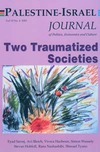"At a time when progress has been disappointing to say the least, it is particularly important that the institutions of civil society, on both sides, reinforce their efforts," said H.E. Patrick Hennessy, the Irish Ambassador to Israel. "It has never been more necessary to promote dialogue across the divide: We have to break down the barriers of prejudice and ignorance." He emphasized that "human rights is not, and cannot be an optional add-on to the search for a lasting solution. Human rights protection must be an integral part of any agenda for a new beginning... an essential component in a peace process."
"Cousins build bridges, not walls," said Mohammad Abu Hartiyeh, who came from East Jerusalem to Tel Aviv together with six other colleagues to communicate his message. He said that the dash in the logo of the Palestine-Israel Journal looks like a bridge, but what the Israeli government is building is "a wall that separates people." PIJ co-editor Professor Daniel Bar-Tal criticized the fact that co-editor Ziad Abu-Zayyad was not granted a permit by the Israeli authorities to attend the event.
Former Israeli Education Minister and Meretz leader Shulamit Aloni, the first person to put human and civil rights on the Israeli agenda, said to the audience that "we all must stand up tall, and make our voices heard against the human rights abuses that are being committed in our name. There is a huge public in Israel that is simply not aware of what is being done in its name. We must criticize, and shout out our protest, even if it requires difficult, extra effort on our part."
Professor Anat Bilsky said she was, "torn between the need to do more and to gain more knowledge". Danny Rubinstein criticized many of his colleagues in the Israeli media for overly cooperating with the government "spin" on events, and not fulfilling their journalistic role as independent watchdogs. Haytham Qayanni urged action, and asked everyone present to focus on the human rights implications of the "security barrier". He quoted a German maxim, "there are no roads, roads are only made by walking."
Leading actress Hanna Maron, who lost a leg in a terrorist action in the 70s, expressed her identification with the struggle for human rights, and read a powerful anti-war poem by Berthold Brecht. An interview with her in mass circulation daily Yediot Ahronot referred to the PIJ human rights evening and the Brecht poem.
Dr Sari Hannafi emphasized the importance of symbols. There should be both an Israeli and Palestinian flag at all joint events and these should be held in a mutually understandable language, or with simultaneous translation. He criticized the Israeli human rights and peace movement for not being active enough, the international human rights movement for not considering refugees to be a major human rights issue, and the Palestinian human rights movements for not being vocal enough in its criticism of violence against innocent civilians.
Members of the audience were impressed by the broad array of personal testimonies of human rights action, from pilot Chagai Tamir, rabbi Ya'acov Rosenberg, physician Ilan Gal, Edna Mordach representing 150 women who participate in Machsom Watch activities and others. And they took note of Uki Marushek Klarman's concern that the younger generation, in both communities, doesn't understand the language of human rights discourse. "It is essential that we find the means of communicating the importance of these issues to them," she stated.
Hillel Schenker
The participants, each of whom spoke or performed for about five minutes, were, in order of appearance: PIJ Co-Editor Prof. Daniel Bar-Tal, H.E. Patrick Hennessy, Ambassador of Ireland, Mohammad Abu Hartiyeh, Founder of the Jerusalem Center for Human Rights, Prof. Anat Biletzky, Chair of B'tselem, journalist Danny Rubinstein, Ha'aretz, Haytam Qayanni, Deputy Director MEND (Middle East Nonviolence & Democracy), actress Hanna Maron, Ya'acov Rosenberg, Assistant Director Rabbis for Human Rights, Eva Musa, Spokesperson Adalah, Chagai Tamir, Pilot's Letter, Yizhar Be'er, Director Keshev Center for Defense of Democracy, singer/songwriter Juan Safady (Lenses), Shulamit Aloni, former Minister Education and Meretz leader, Prof. Chaim Gans, Head Minerva Center for Human Rights at Tel Aviv U., lawyer Dina Shibli, Jerusalem Center for Social and Economic Rights, Dr. Sari Hanafi, SHAML Palestinian Diaspora & Refugee Center, singer Yaffa Yarkoni & Dana Shafis, journalist Benjamin Pogrund, former Deputy Editor Rand Daily Mail, Amnon Vidan, Director Amnesty Israel, David Shaham, former head General Union of Writers in Israel, Uki Marushek Klarman, Director Adam Institute for Democracy & Peace, Gaby Laski, legal adviser Committee Against Torture, Dr. Ilan Gal, Chair Physicians for Human Rights, Amos Gvirtz, Chair Committee Against House Demolitions, Dr. Ayal Gross, Board of Directors ACRI Association for Civil Rights in Israel and Edna Mordach, Machsom (Checkpoint)Watch. The moderator was Naftali Raz.

